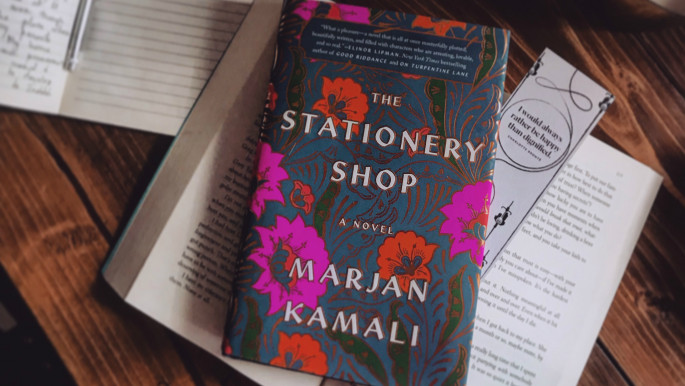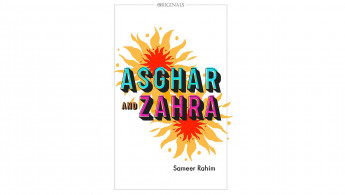
An unlikely marriage: Asghar and Zahra
An unlikely marriage: Asghar and Zahra
Sameer Rahim's debut novel follows the story of an unlikely couple's first months of marriage.
4 min read
Asghar and Zahra is Sameer Rahim's debut novel
What makes a marriage work? Is love, or the idea of love, enough to sustain a lifetime commitment? And do opposites really attract?
In his debut novel Asghar and Zahra, Sameer Rahim tries to answer all of those questions in more, in the story of an unlikely couple's first months of marriage.
Asghar and Zahra have grown up in the same British Muslim community in west London, the children of rival families who run two different mosques. But where Asghar is traditional, subservient and shy, Zahra is confident, ambitious and always trying to blend her family's culture and traditions with the world she lives in.
It seems like a marriage made of opposites, which would be drama enough, but Rahim adds to the mystery of Asghar and Zahra by quickly letting us know that their love match is the result of just a couple of meetings, and that we as readers join Asghar and Zahra's community in questioning the relationship.
"That Zahra was three years older than him only added to the delicious scandal," writes Rahim. "How had he managed it, everyone wondered?"
 |
|
| Read more from The New Arab's Book Club: A bookish love story in Iran: The Stationery Shop |
Rahim chooses to initially take us forward into the relationship, through an awkward honeymoon in which Asghar seems more interested in a Spanish Muslim convert called Tariq than he does with his wife, and into the couple's first months living together, where Zahra heads off to work while her husband tries to bring himself to enjoy his studies.
Small romantic moments between the couple always have a shadow hanging over them, particularly as Asghar and Zahra fail to consummate their marriage until months down the line.
The mundanity of the couple's relationship is only just in contrast to the things we learn about them both from their pasts.
Rahim lets us into an incident from Asghar's teenage years, in which he fell in love with a friend's sister over the course of two letters she sent to him asking for help with a religion project; the foreshadowing here is obvious – with first Sarah and now Zahra (no coincidence that the name's are so similar), Asghar has made it a pattern to fall in love with the idea of falling in love with someone he has built up to be the perfect woman.
Meanwhile, Zahra's past is a little more gritty, although not by much. Up until her marriage, the defining romantic relationship of her life was only a little less chaste than Asghar's imagined love affair with Sarah, and the unfolding of it shows that Zahra isn't actually as modern as Asghar, and she, might think.
When we do finally get to the story of how Asghar and Zahra got together, it's a little underwhelming, although that may be the point, given that from both characters' points of view, their whole marriage has subsequently been underwhelming.
Although the story alternates between the two characters, it feels like Raheem is more comfortable with Asghar, and we get more of an understanding of what makes him operate and how easily he can be swayed; Tariq reappears in the UK, where he draws Asghar into what could eventually become an extremist group, but is currently a gathering of men who feel slighted by women and want to use religion as an excuse for their damaged egos.
Zahra, on the other hand, isn't as well drawn as Asghar, and her defining feature often seems to be her beauty and the many descriptions of what she's wearing; it's as though Raheem sometimes doesn't know how to get to the core of Zahra so focuses on the superficialities.
Where Raheem does shine is with the novel's humour. This isn't a laugh out loud book, but its observations about relationships within families and communities are astute, and often shot through with a subtle humour. Asghar's involvement in Tariq's group is also funny; while Asghar takes him seriously, the way Tariq is drawn means he's more of a joke than a threat to the reader.
The final act of the novel, which initially begins with a funny trip to the gym, pushes Asghar and Zahra out of their comfort zones, and into an ending that is designed to give hope.
It's sweet, although a little too perfect; like a lot of things in the novel, it's very clearly signposted, making it a little less effective. But the novel is sweet and sympathetic, and despite its imperfections, does succeed in making you feel for its title characters, and root for Asghar and Zahra to stay Asghar and Zahra.
Sarah Shaffi is a freelance literary journalist and editor. She writes about books for Stylist Magazine online and is books editor at Phoenix Magazine. She is a judge for the Jhalak Prize 2019. Sarah is editor-at-large at independent children's publisher Little Tiger Group. She regularly chairs author events, and is co-founder of BAME in Publishing, a networking group for people of colour in publishing.
Follow her on Twitter: @sarahshaffi
The New Arab Book Club: Click on our Special Contents tab to read more book reviews and interviews with authors:



